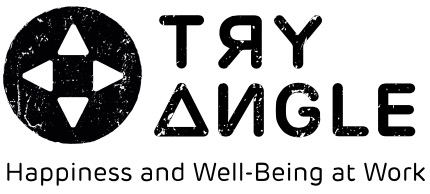‘Happiness at work’, truly a blissful word. At Tryangle, we are downright excited to be able to work on our clients’ happiness at work. But what does the term actually mean? It is not so straightforward when you reflect more deeply about it. Everyone will have a different interpretation of the word. So, let’s try for ourselves to define happiness at work.
(Working) Life is a picnic
Picture this: every Monday, you jump out of your bed because you are excited to go to work again! The sun is shining and there are hardly any traffic jams. Your parking space is free and waiting for you. Your colleagues greet you enthusiastically with a wide smile as if they are starring in a toothpaste commercial. They hang on your every word when you talk about your weekend. Everyone laughs at your jokes. Your boss calls on you to compliment you on your work and suggests an exciting training. You know for sure: there will be a raise this year. Not that it is really necessary with the good salary you already earn. An important client has a cake delivered because he is extremely pleased with the work carried out. The office is pleasantly buzzing. And before you know it, it’s time to go home. Already?
Seek and you will find
In search of Happiness at Work … When we consult “Van Dale’s Great Dictionary of the Dutch language” for the right definition, we become a little less happy. ‘Happiness at work’ is still not included in its scope.
In Scandinavia, however, the term does exist. The Danes, for example, speak of arbejdsglaede. Be sure to visit www.whattheheckisarbejdsglaede.comif you care to learn more about it.
Work happiness theory
As early as 1943, long before happiness at work became popular, Maslow published his theory of human motivation. He arranged the universal needs of man in the well-known pyramid. According to this theory, man will not be motivated to meet higher-level needs until his lower-level needs have been satisfied. The theme of happiness at work is therefore only addressed in one’s life when other basic needs have already been met.
- Self-actualisation
- Esteem
- Love and belonging
- Safety and security
- Physiological needs
The factors of job satisfaction
Good health, a happy family life, a warm home, a job, money in the bank, … These goals, inspired by prosperity and well-being, are of course important. But as soon as these needs have been met, there is room for the question ‘what’s next’. Further questions will then surface into which other factors can make a person happy. And that brings us to the theme of happiness at work.
People often think that the factors mentioned above relate to happiness at work, but nothing could be further from the truth. When we talk about a well-paid job that helps to ensure a flourishing family life, we actually refer to ‘job satisfaction’. It is of course logical that people think along those lines, because it’s best to start at the bottom. So, job satisfaction is about your salary package, your terms of employment, your working environment, infrastructure, IT support, etc. These elements are often embedded in corporate culture and usually non-negotiable for individual employees. That is precisely why it is important for employees to choose the right company; a company whose culture and environment match your expectations, so that all your job satisfaction boxes can be ticked off. When the basic needs on your list are fulfilled, you will feel satisfied at work. That, however, does not mean that you are alsohappyat work. It is only the first step.
The foundations of happiness at work
Your happiness at work is mainly determined by the people you work with and the purpose you find in your work. It should come as no surprise that employees who foster a constructive working relationship with their manager, and/or enjoy an energetic and pleasant atmosphere among colleagues, are happiest at work. And it is a well-known fact that happy employees are productive and committed, is it not?! On the other hand, happiness at work is also determined by the extent to which you can contribute something valuable to a greater whole.
Job satisfaction is therefore a much-needed basic condition to realise happiness at work, but in order to be able to attain happiness at work, more components are required. Happiness at work is based on foundations such as trust, honesty, safety, connection, appreciation and progress.
Step by step
Happiness at work often goes hand in hand with a significant growth process. Firstly, on a personal level and, depending on your experiences and possibilities, subsequently also on a team and even organisational level. The latter two levels are more difficult to achieve. After all, rolling out work happiness at team and organisation level requires a corporate culture that supports happiness at work, employees who are open, and managers who can steer on results and relationships.





